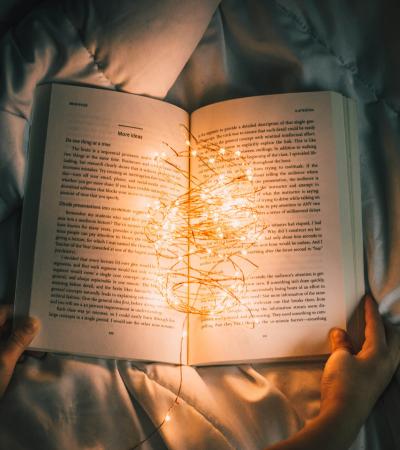My library is in the tiny town of Fenton, Iowa. To garner a bit of perspective about just how tiny we are talking, the nearest gas station is 13 miles away, groceries and job opportunities are 30 miles, and we are equal distance from Des Moines and Minneapolis/St. Paul, which will take you 2.5 hours of interstate, if you don’t stop to see the sights.
No school in town. No elder care facility. No bustling main street. Remote, yet we still pursue quality programming.
The 1939 hardware store now houses the Fenton Public Library, which serves two farming communities with less than 500 residents combined, the surrounding rural population, and remnants of three long-abandoned towns in northern Iowa. Where our most robust readers refer to baby boomers as "kids" and young families are often low-income or transient, we strive to maintain a vibrant library. Our community has a small pool and empty pockets, yet our patrons still crave culture.

During my initial interview with the library trustees, I could sense they were desperate to resuscitate the library. As the director and sole employee, I wear all the hats and get paid to don them part-time. No volunteers, no Friends of the Library. Just a supportive board and community. Collection management? On it. State paperwork? If I must. Leaking building and toilet cleaning? That’s me. Technology expert? If you say so. Story time? Yes, please! Oh, you want to check out a book? OK. All the things we do as librarians rolled up in a 20-hour work week.
Short on time? You betcha, yet I knew the library could stretch for our patrons. And so I set out to create an adult speaker series on the cheap.
Step 1: Brainstorm a theme
What are your best resources? For rural Fenton, Iowa the answer is our people and world-class agriculture. We export both. After cultivating a few thoughts, an idea took root.
We decided on the theme Locally Grown for our speaker series. Fenton Public Library’s idea was to invite notable people, who had grown up in the area to come back to their hometown library with the purpose of discussing their hobby, profession or passion. Having a theme helped me build a cohesive series and aided in marketing.
Step 2: Generate a list of possible speakers
I asked trustees for input, opened a digital suggestion box and even scoured old yearbooks to form a handbill for our Locally Grown theme. Then I cold-called. Everyone was flattered, a few were hesitant, but ultimately, the vast majority agreed to give of their time. We were flexible and accomodating to speaker's schedules, and hosted them when it was convenient for them to fit us in — so there wasn't consistency for time of day or day of the week when programs were held.
I had enough speakers to offer one event every month for a year, plus several inroads for the next year including the five Fenton-native authors. Our list included:
- August: Trudy Huskamp Peterson, the former archivist of the United States
- September: The Iowa Barn Quilt Guy (Danny L. Stieber)
- October: Ashley Reed, curious, creepy and cute critters
- November: Robin Keith, music therapist
- December: Michael Tidemann, author and journalist
- January: Bill Newbrough, JungleVine founder
- February: Stacie Busch, cake decorator
- March: Marilyn Mark, artist
- April: Dave Potratz, sports and entertainment broadcaster, in addition to a Cake Walk fundraiser
- May: Open House; I took a breath to finalize the summer reading program
- June: Children’s Summer Reading Program
- July: Adult Summer Reading activities and Dallas Wiener, mobile security and the 5G future
Step 3: Get the public’s attention!
The next step was promoting Locally Grown to our community. I utilized many of my go-to methods to advertise.
Local news outlets have free calendars for their publications and broadcasts, so they are a staple for our advertising. This step builds relationships with reporters, which can produce on-air interviews or articles about what is happening at your library.
I try to create fliers and social media posts that are clean, crisp and modern to draw the eye. I not only place them on public bulletin boards, but also ask businesses to have them where people gather. The local farmers sit at a table in the elevator to have their pre-dawn coffee. I have been known to slip a poster next to their mugs. The beauty shop owner snags a flier to put by the hairdryer. Keeping the church and school secretaries abreast of the library happenings also gets us in the weekly announcements.
FPL promotes events on our web and social media pages, but then I also send a personal email a couple days prior to the event to those who have requested the reminder. This practice aids in word-of-mouth-marketing.
If this all seems overwhelming, don’t fret. Once you have everyone in your contacts, it is just one email with one attachment carbon-copied to several entities.

Step 4: Provide a welcoming environment
Beyond seating and technology needs, FPL tries to provide refreshments at each event. I don’t advertise this addition for two reasons. One, I do not wish for food to become the incentive. Two, I never know what I’m going to make until advertising is already printed. It’s just a perk for those that frequent our events.
If it’s a morning event, we’ve had baked goods. If the event hovers around the dinner hour, I’ll make a pot of soup. Evenings, sweets make an appearance. Nothing elaborate, but appreciated.
If you’d rather not step foot in the kitchen, inquire with the local 4H or scout leaders if their group would provide snacks for your events. School honor societies and leadership may also have volunteer hours to fulfill. The added benefit is more attendees, as the student groups tend to stay and listen.
Step 5: Gather feedback
Our feedback collection process was simple: I passed out normal, simple survey slips, and attendees toss the completed sheets in a basket on their way out. What I tend to find more valuable is, when you are thanking everyone for coming, ask the audience how they heard about the event. (Another tip: often people mill around after an event; keep your ears open while folding chairs. You can glean constructive tidbits.) I used the feedback to create a new theme and improve upon our adult programming for the next year.
The numbers
Locally Grown averaged 32 attendees per event. (Remember, our community has 238 residents!) All programs had attendees from other towns, counties, or states. Our costs were $125 total — $75 for mileage and $50 in food — but FPL gained over $500 in unsolicited donations.
No doubt, the effort was well received and gave our community reward beyond measure.
Michele Espe is the director of the Fenton Public Library in Fenton, Iowa. This blog post is part of a series, organized by Iowa State Library, exploring programming in small libraries throughout the state.



